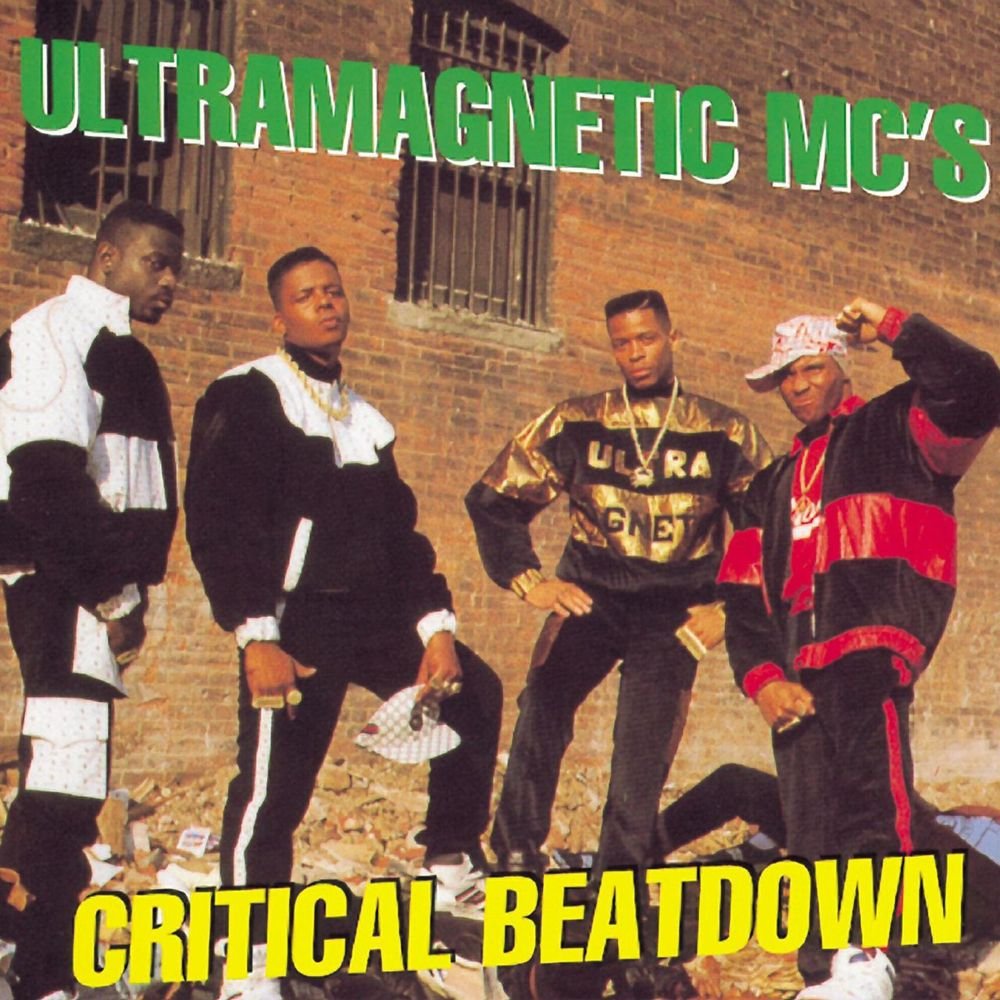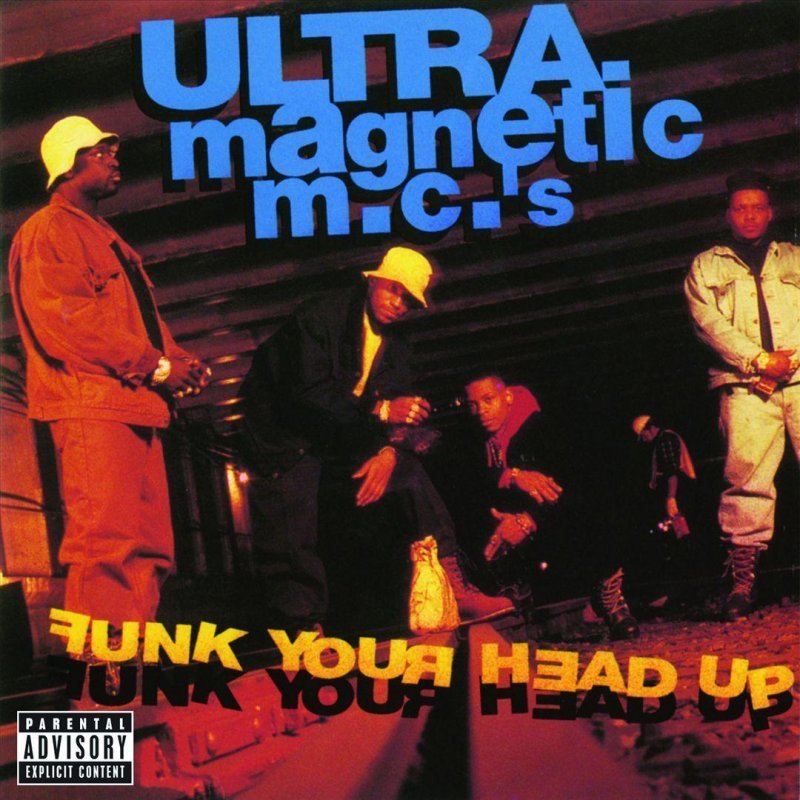Happy 30th Anniversary to Ultramagnetic MCs’ third studio album The Four Horsemen, originally released August 10, 1993.
In the beginning of “Bring It Down to Earth,” a track that appears a little over half-way through Ultramagnetic MCs’ The Four Horsemen, rapper “Kool Keith” Thornton proclaims, “It’s time to come out and give the people something they can understand! Something not too complicated!” Of course, barely ten seconds later, Keith is kicking about as convoluted a verse as had been recorded during that era, rapping, “Get with the elements, eloquent spacecraft / Change my gamma flow, 1-3-8-7 / 20-0-9-6, serial silver seven / I got the skills to rap, so what you want Spock? / Style like Captain Kirk, gamma ray one block.”
“Bring It Down to Earth” exemplifies The Four Horsemen, the Ultramagnetic MCs’ third album, released 30 years ago. Kool Keith and Cedric “Ced Gee” Miller deliver nearly impenetrable lyrics loaded with references to “space Elroy shit,” over a swirling, intense musical soundscape. Though many a rapper on the underground hip-hop scene from the ’90s and ’00s list their debut Critical Beatdown (1988) as an influence, The Four Horsemen is the prototype for the “modern” left-of-center hip-hop release: a dense gem featuring hip-hop for the advanced listener.
Made up of Kool Keith, Ced Gee, producer/rapper Trevor “TR Love” Randolph, and DJ/producer Maurice “DJ Moe Luv” Smith, Ultramagnetic MCs are abstract hip-hop icons. The Bronx based crew hit the hip-hop scene in the mid ’80s, releasing a spacey, bugged out version of hip-hop that seemed almost alien at the time. The aforementioned Critical Beatdown is one of the best albums ever and has earned a strong cult following over the years.
The Four Horsemen was released a little over a year after the release of Funk Your Head Up (1992), a critically maligned but truthfully solid sophomore album by the group. In 1992, the group was signed to Polygram Records, which really wasn’t the right fit. A good chunk of the album had the classic Ultramagnetic sound, but there were also somewhat embarrassing stabs at pop appeal and radio friendly offerings that didn’t work at all. After poor sales, the group migrated to Wild Pitch Records, a label known for its quality product but shady business dealings. For The Four Horsemen, the label let Ultramagnetic be as weird and esoteric as they wanted to be.
The album begins with “We Are the Horsemen,” a laid-back ode to space exploration. The group fashions themselves as the hip-hop, all-male version of the Robinson family, searching the cosmos for lost worlds. While rapping to a slow vibe and horn-based loop, the pair of emcees keep the references incredibly obscure and the rhymes practically unstructured, with Keith rhyming in a stream of seeming non-sequiturs: “I kick lyrics on Earth, you think I’m cosmic / A spacewalker, dipping in my spacecraft / Through molecules, a steel wall interphase / The Fourth Horseman, legendary universe / Dark shadow human rhyming on a funky verse.”
“Two Brothers With Checks (San Francisco, Harvey),” the album’s first single, is one of the most leftfield songs to ever receive a video and push. The beat features layered trumpets and vocals, as well as the hard-hitting Skull Snaps drums and funk filled percussion. In terms of subject matter, Ced and Keith are waaaaaaay off in the weeds, filling their rhymes with references to sci-fi TV shows and their favorite (mostly) New York-based baseball players from the 1970s. To my knowledge, this is the only song that name checks Don Hahn, Thurman Munson, and Ray Fosse. The song’s chorus remains as nonsensical today as it did a quarter of a century ago.
Listen to the Album:
“Two Brothers With Checks” touches on Ultramagnetic’s other obsession throughout The Four Horsemen: America’s pastime. They demonstrate that their love of baseball goes beyond the name drops, as they conduct an in-depth history lesson on the Negro Leagues during their 1930s and 1940s hey-day on “The Saga of Dandy, The Devil and Day.” Unlike the streams of abstract thought they kick throughout most of The Four Horsemen, here Ced and Keith present a lucid and detailed description of baseball’s segregated period.
Pre-dating Ken Burns’ Baseball docu-series by at least a year, Keith and Ced praise the accomplishments of players like Satchel Paige, Cool Poppa Bell, Double Duty, and the Thunder Twins on the Godfather Don-produced track, while trying to capture the experience of watching the game on a summer’s day. They further advocate for the construction of a Hall of Fame to commemorate the impact that the Negro Leagues had on the game and the baseball-loving population.
Godfather Don lends his production talents to three other tracks on The Four Horsemen, including the album’s second single “Raise It Up.” The song, one of the album’s highlights, is as close as the group gets to recording a traditional mid-’90s boom bap track. Over a freaked snippet of Bob James’ “Nautilus,” Ced, Keith, and Don all rhyme about the group elevating their style, content, and consciousness. As Keith raps, “They say, ‘Yo, Keith, you Kool, you using big words / I went to college, I'm even more stupid-er / Back on the scene to put a lesson out / Even if I have to pull a black Smith and Wesson out.” Meanwhile, Ced explains the group’s creative process, rapping, “Creating a fusion, of sampling hits / We all came down just to be distinctive / Some rappers complex, but they can’t see the music / We show orchestration, and with funky prevention / It was different and Black, and it caused devastation.”
Truthfully, The Four Horsemen shows two emcees going in opposite directions. Kool Keith was clearly ascending at the time and is very much the star of the album. Already known for his distinctive voice and left-of-center perspective in his raps, he finds another gear on The Four Horsemen, depicting even more surreal imagery and weaving more complicated rhyme schemes. Keith had always had a good deal of solo material on the group’s previous two albums, but this time around he occupies even more real estate. The album proved to be an important transitional step for Keith’s solo career, which is still going strong over three decades later.
There had been rumblings that Keith had been recording material for a solo project during 1992, and a pair of those tracks appear on this album. These songs include more material resulting from Keith’s collaborations with Godfather Don. “Checkin’ My Style” was a product of the Cenobites sessions, an EP that Keith and Don recorded together; Don’s verse was removed for The Four Horsemen version. Although “Checkin’ My Style” may be one of the worst-mixed songs ever to appear on a major label release, it’s still undeniably dope. Built around a horn loop and a simple drum track, it plays like a demented Sunday church service, with Keith holding court as a madcap reverend, kicking unorthodox flows, sometimes barely rhyming at all: “As I rock so well, spanking tail, check the beats / My style is so early, you couldn’t catch it on Bobbito / As I flaunt and I stretch just like a rubber band – popping! / Stopping every rapper like a trooper on a turnpike / I'm long and strong and just like the Lincoln Tunnel.” He closes the song in memorable fashion, shouting that he doesn’t need artists like Central Line, Zapp, Chic, or Bohannon, but rather “I just need what I need!”
On “See the Man on the Street,” the other Godfather Don produced solo endeavor, Keith imagines himself a demented superhero, rocking a “white mask, a black cape, two pair of silver gloves, and nobody knows who I am.” Over a James Brown-infused track, Keith again utilizes his unconventional rhyme patterns, vowing, “Rappers know me, I'm bugged, I chop your ass right / Take that body and bag it, then I'm out of sight.” Later on “One, Two, One, Two,” Keith delivers more straight-ahead battle rhymes, but this time repeating the last word of every stanza twice, which has a slightly disconcerting effect.
Enjoying this article? Click/tap on the album covers to explore more about Ultramagnetic MCs:
The group works well together throughout The Four Horsemen. The dark and eerie “Time To Catch a Body” is excellent, as Keith and Ced offer peeks into the mind of lyrical mad men. The posse-cut “Don’t Be Scared” is similarly effective, a swinging, jazzy yet creepy endeavor; to this day, I still don’t know who appears on the last verse of the song. The album ends with Ultra taking things back to outer space, specifically engaging in intergalactic sexual escapades on “Big Booty.”
The Four Horsemen was essentially Ultra’s swan song as a group. Keith began to pursue his career as a solo artist soon after the album’s release, building on his performance to create a menagerie of bizarre alter-egos and characters. Ced Gee succumbed to “personal issues,” and ended up selling reams of unreleased Ultramagnetic material to Tuff City Records for them to reissue continuously throughout the mid to late ’90s. Moe Luv and TR Love formed a production team and mentored new talent, including artists like Raw Breed, but that ended as well. The group has reunited and broke up again a few times over the years. One of these reunions led to their fourth album Best Kept Secret (2006). The less said about that project, the better, as it pales in comparison to even the Tuff City bootlegs.
The Four Horsemen remains an excellent demonstration of a group embracing its inherent oddness and eschewing most possibilities for pop appeal. Ultramagnetic never comprises their identity on this album, and as a result, the music still stands up today. It’s as good of a genuine unplanned final act as most groups can hope for.
LISTEN:
Editor's note: this anniversary tribute was originally published in 2018 and has since been edited for accuracy and timeliness.



